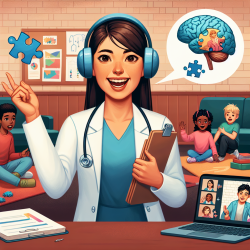As an online therapy provider, TinyEYE is committed to integrating the latest research into our practices to benefit the students we serve. A recent study titled "ERBB4 exonic deletions on chromosome 2q34 in patients with intellectual disability or epilepsy" provides insights that can help practitioners enhance their skills and potentially improve outcomes for students with intellectual disabilities (ID) or epilepsy.
ERBB4 encodes the tyrosine kinase receptor HER4, a critical regulator of neurodevelopmental processes. The study identifies that deletions in the ERBB4 gene can lead to either non-syndromic ID or generalized epilepsy. Understanding the implications of these findings can be pivotal in tailoring our therapeutic approaches.
Key Takeaways from the Research
- ERBB4 deletions are associated with mild to moderate developmental delays, ID, or epilepsy.
- Patients with ERBB4 deletions exhibit a range of symptoms including speech delay, executive functioning difficulties, and aggressive outbursts.
- There is no clear correlation between the size or location of the deletion and the severity of the symptoms.
How Practitioners Can Implement These Findings
Here are some practical steps you can take to incorporate the research findings into your therapy sessions:
- Individualized Therapy Plans: Use genetic information to create personalized therapy plans. Understanding that a student has an ERBB4 deletion can help tailor interventions to address specific deficits such as speech delay or executive functioning issues.
- Behavioral Interventions: Be prepared to manage aggressive outbursts and hyperactivity. Techniques such as cognitive-behavioral therapy (CBT) and positive reinforcement can be beneficial.
- Collaborate with Geneticists: Work closely with geneticists to understand the specific genetic makeup of your students. This collaboration can provide deeper insights into the best therapeutic approaches.
- Continued Education: Stay updated with ongoing research in genetic influences on neurodevelopmental disorders. This knowledge can continually refine and improve your therapeutic practices.
Encouraging Further Research
While this study provides valuable insights, there is still much to learn about the ERBB4 gene and its role in neurodevelopmental disorders. As practitioners, we can contribute to this body of knowledge by:
- Documenting Observations: Keep detailed records of your students' progress and any unique symptoms. This data can be valuable for future research.
- Participating in Studies: Consider collaborating with research institutions to participate in studies related to genetic disorders.
- Advocating for Research Funding: Support initiatives that fund research into genetic causes of neurodevelopmental disorders.
By integrating these research findings into our practices and encouraging further research, we can better support our students and help them achieve their full potential.
To read the original research paper, please follow this link: ERBB4 exonic deletions on chromosome 2q34 in patients with intellectual disability or epilepsy.










